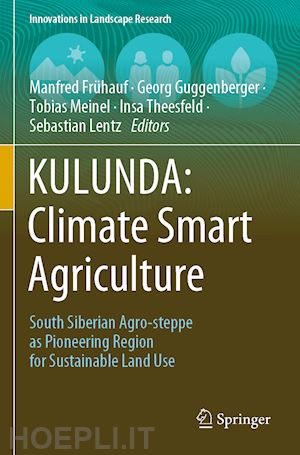
Questo prodotto usufruisce delle SPEDIZIONI GRATIS
selezionando l'opzione Corriere Veloce in fase di ordine.
Pagabile anche con Carta della cultura giovani e del merito, 18App Bonus Cultura e Carta del Docente
Foreword.- 1:Background to the natural landscape and the consequences of the ecosystem conversion.- 1.1 Background of the natural landscape.- 1.1.1 The Kulunda-steppe as part of the Eurasian steppe belt (Authors: Silanteva, M.M- Hensen, I.).- 1.1.2 Climate and vegetation gradients: from the forest to the dry steppe (Authors: Lashchinsky, N., Wesche, K.).- 1.1.3 Soils of the Kulunda steppe (Authors: Kudryavcev, A. E., Mizgirev, A., Guggenberger, G., Mikutta, R.).- 1.2 Anthropogenic influences.- 1.2.1 Early Steppe cultures (Authors: Silanteva, M.M., Kudryavcev, A. E.).- 1.2.2 Russian settlements and the beginning of agriculture (Authors: Frühauf, M., Schmidt, G.).- 1.2.3 The virgin land policy (Authors: Frühauf, M., Schmidt, G.).- 1.2.4 Climate change (Authors: Kharlamova, N.).- 1.3. Consequences of the ecosystem conversion.- 1.3.1 Influence of agricultural cultivation on vegetation distribution and biodiversity (Authors: Silanteva, M.M., Hensen, I.) .- 1.3.2 Soil erosion and physical parameters (Authors: Schmidt, G., Illiger, P.,) .- 1.3.3 Soil-water content (Authors: Meißner, R., Belaev, V.I., Stephan, E.) .- 1.3.4 Soil salinization (Authors: Mikutta, R., Reichert, E., Eisold, X.).- 1.3.5 Interaction of agricultural utilization and climate and loss of soil organic matter (Authors: Guggenberger, G., Belaev, I.V., Schmidt, G., Bischoff, N., Illiger, P.).- 1.3.6 Types and occurrence of the ecosystem degradation (Authors: Frühauf, M., Heese, S., Walde, I.).- 1.3.7 Current development tendencies and future perspectives (Authors: Frühauf, M., Guggenberger, G., Belaev, I.V., Bykov, N., Kudryavcev, A. E.,).- Chapter 2: Socio-economic and institutional drivers and impacts of land use change.- 2.1 Socio-economic drivers of social change: 2.1.1 Transition of agriculture in Altai krai: The role of structural change, introduction of modern soil cultivation practices and agricultural policy (Authors: Bavorova, M., Ponkina, E., Herzfeld, T., Immaverdiev, N., Baisakova, N., Ganga, S., Hirschauer, N.,) Abstract available.- 2.1.2. Title: The Role of the Legal Ownership Forms of Farms in Achievement of Efficiency of Cereal and Sunflower Production in Kulunda Steppe of Altai Krai (Authors: Ponkina, E.V. Lobova, S.V.) Abstract available.- 2.2 Institutional drivers of social change.- 2.2 1 The role of institutions in effective policy implementation to fight land degradation in West Siberia (Authors: Theesfeld, I. and L. Jelinek).- 2.2.2 Land relations: actors, institutions and the quality of land use (Author: O. Fadeeva).- 2.3 Social-demographic drivers and impacts of land use change.- 2. 3.1 Geography of demographic and migration processes in the Kulunda steppe of the Altai Kraij (Authors: Bykov, N. Lentz, S., Wust, A.).- 2.3.2 The socio-economic environment of innovative agriculture in Altai Krai.“ (Nikulin, N., Sergienko, A., Vinogradskaja, O., Kurakin, A., Lentz, S., Wust, A.).- Chapter 3: Potentials and Strategies of adapted landuse as basis for ecological and social-economic sustainable development of the rural landscape.- 3.1 Demands for modern cropping systems (Authors: Meinel, T.; Grunwald, L.C.).- 3.2 Modern agricultural technology for the conditions of the steppe regions of the Altai-Krai (Authors: Belaev, I.V; Grunwald, L.C. Meinel.T).- 3.3 Testing of technologies with minimal soil tillage for row crops and cereals (Authors: Grunwald, L.C., Meinel, T.; Belaev, I.V, Koshanov, N., Rudev, N.).- 3.4 Improving the efficacy of crop protection measures (Authors: Grunwald, L.C., Meinel, T.).- 3.5 Effects of the modern technologies on the economic efficiency of the cropping systems (Authors: Hiller, K.; Frühauf, M.; Meinel, T.; Tillack, P.).- 3.6. Possibility of re-naturalising of steppes and increases of biodiversity (Authors: Hensen, I., Silanteva, M.M.).- Chapter 4: Change in Regional Development.- 4.1 Contested Concepts.- 4.1.1 The Regional Development Concept Altai 2025 (Authors: Nikulin, A., Theesfeld, I., Sergienko, A. Lentz, S.).- 4.1.2 Changes in Economic Institutions and Policy (Authors: Nikulin, A., Theesfeld, I., Sergienko, A. Lentz, S.).- 4.1.3 Changes in the Educational System and Cross Sectional Co-operation (Authors: Nikulin, A., Theesfeld, I., Sergienko, A. Lentz, S.).- 4.1.4 Long-term trends (Authors: Nikulin, A., Theesfeld, I., Sergienko, A. Lentz, S.).- 4.2 Current practices of transformation.- 4.2.1 Practices and constraints of further education of farmers in the Kulunda Steppe (Authors: Chizhov, V.N., Ryzhkova, N.A, Liebelt, P.).- 4.2.2 Fielddays for technology transfer and perceptions of dealers and farmers (Authors: Belajew, D., Koshanov, N., Meinel, T.; Grunwald, L.C.).- 4.2.3 Technology learning and transfer of knowledge – practices and lessons learned from the German Degree Programm in Bernaul (Authors: Schmidt, G., Kolander, R. Frühauf, M., Liebelt).- Chapter 5: Summary and outlook (short).- 5.1 Zukunftsvisionen: Die Kulunda-Steppe: Modellregion für nachhaltige Landnutzung, Motor der Regionalentwicklung und neuer „Weltbrotkorb“? (Author: Frühauf, M.).- 5.2 Herausforderungen, Hemmnisse und Potenziale für klimaangepasste LU und zukünftige Rolle des Gebietes angesichts „globaler Herausforderungen“ (Author: Frühauf, M.).- 5.3 Neue Herausforderungen durch Veränderung globaler Rahmenbedingungen (Politik, Ernährung, Klimawandel) (Author: Frühauf, M.).- Chapter 6: Acknowledgement.











Il sito utilizza cookie ed altri strumenti di tracciamento che raccolgono informazioni dal dispositivo dell’utente. Oltre ai cookie tecnici ed analitici aggregati, strettamente necessari per il funzionamento di questo sito web, previo consenso dell’utente possono essere installati cookie di profilazione e marketing e cookie dei social media. Cliccando su “Accetto tutti i cookie” saranno attivate tutte le categorie di cookie. Per accettare solo deterninate categorie di cookie, cliccare invece su “Impostazioni cookie”. Chiudendo il banner o continuando a navigare saranno installati solo cookie tecnici. Per maggiori dettagli, consultare la Cookie Policy.